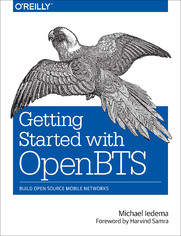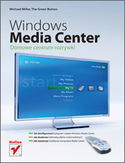Getting Started with OpenBTS - Helion

ISBN: 978-14-919-2429-7
stron: 124, Format: ebook
Data wydania: 2014-01-13
Ksi─Ögarnia: Helion
Cena ksi─ů┼╝ki: 63,74 z┼é (poprzednio: 74,99 z┼é)
Oszczędzasz: 15% (-11,25 zł)
Deploy your own private mobile network with OpenBTS, the open source software project that converts between the GSM and UMTS wireless radio interface and open IP protocols. With this hands-on, step-by-step guide, you’ll learn how to use OpenBTS to construct simple, flexible, and inexpensive mobile networks with software.
OpenBTS can distribute any internet connection as a mobile network across a large geographic region, and provide connectivity to remote devices in the Internet of Things. Ideal for telecom and software engineers new to this technology, this book helps you build a basic OpenBTS network with voice and SMS services and data capabilities. From there, you can create your own niche product or experimental feature.
- Select hardware, and set up a base operating system for your project
- Configure, troubleshoot, and use performance-tuning techniques
- Expand to a true multinode mobile network complete with Mobility and Handover
- Add general packet radio service (GPRS) data connectivity, ideal for IoT devices
- Build applications on top of the OpenBTS NodeManager control and event APIs
Osoby które kupowały "Getting Started with OpenBTS", wybierały także:
- Biologika Sukcesji Pokoleniowej. Sezon 3. Konflikty na terytorium 124,17 zł, (14,90 zł -88%)
- Windows Media Center. Domowe centrum rozrywki 66,67 zł, (8,00 zł -88%)
- Podręcznik startupu. Budowa wielkiej firmy krok po kroku 93,13 zł, (14,90 zł -84%)
- Ruby on Rails. ─ćwiczenia 18,75 z┼é, (3,00 z┼é -84%)
- Scrum. O zwinnym zarz 78,42 zł, (14,90 zł -81%)
Spis tre┼Ťci
Getting Started with OpenBTS eBook -- spis tre┼Ťci
- Getting Started with OpenBTS
- Foreword
- Introduction
- Who Should Read This Book
- Why I Wrote This Book
- A Word on Mobile Networks Today
- Navigating This Book
- Online Resources
- Conventions Used in This Book
- Safari Books Online
- How to Contact Us
- Acknowledgments
- 1. Getting Set Up
- Hardware Components
- Linux Server
- Software Defined Radio
- Antennas
- Test Phones
- Test SIMs
- Using spare SIMs
- DIY SIMs
- Batch SIMs
- Full-size versus micro versus nano
- Operating System and Development Environment Setup
- Git Compatibility
- Downloading the Code
- Building the Code
- Installation
- Installing Dependencies
- Coredumper library
- A5/3 library
- Installing Components
- System configs
- Asterisk
- SIPAuthServe
- SMQueue
- OpenBTS
- Starting/Stopping Components
- Installing Dependencies
- Hardware Components
- 2. Initial Testing and Configuration
- Initial State
- Confirm Radio Connectivity
- Ettus Research Radios
- Range Networks Radios
- Troubleshooting USB
- Troubleshooting Ethernet
- Starting Up the Network
- The Configuration System and CLI
- Changing the Band and ARFCN
- Range Networks Radio Calibration
- Ettus Research Radio Calibration
- Searching for the Network
- Testing Radio Frequency Environment Factors
- Reducing Noise
- Antenna alignment
- Downlink transmission power
- Boosting Handset Power
- Reducing Noise
- First Connection
- Finding the IMSI
- Finding the IMEI
- Adding a Subscriber
- Connecting
- Test SMS
- Echo SMS (411)
- Direct SMS
- Two-Party SMS
- Test Calls
- Test Tone Call (2602)
- Echo Call (2600)
- Two-Party Call
- Measuring Link Quality
- Configuration System, Continued
- config
- devconfig
- rawconfig
- unconfig
- rmconfig
- Personalizing Your Network
- Shortname
- Registration Messages
- 3. Troubleshooting and Performance Tuning
- The stats Command
- Runtime Logs
- Log Levels
- Environmental Tuning
- Nonsubscriber Phones
- Coverage Area
- Shrinking physically
- Shrinking by policy
- Signal Distortion
- Stronger, Cleaner Signals
- 4. From Single to Multinode
- Mobility, Handover, and Roaming
- Mobility
- Handover
- Roaming
- Topology
- Central Services Setup
- Remove OpenBTS
- Configure Logging
- Asterisk, SMQueue, and SIPAuthServe
- Tower Setup
- Configure SIP Proxies
- Configure Logging
- Topology Reworked
- Adding Neighboring Towers
- Must Be Identical
- Step-by-step
- Must Be Unique
- Step-by-step
- Neighbor List and Command
- Neighbor-Enabled Commands
- Must Be Identical
- Coverage Overlap Tuning
- Mobility, Handover, and Roaming
- 5. GPRS
- Enabling/Disabling
- Central Services
- Connecting
- Troubleshooting
- Performance Tuning
- Voice versus GPRS
- Individual Handset Throughput
- Coverage Area versus Throughput
- Expectations
- 6. OpenRegistration
- Enabling
- Personalizing
- Disabling
- 7. NodeManager APIs
- nmcli.py
- Version API
- Configuration API
- Read All Keys
- Read One Key
- Update
- PhysicalStatus API
- 8. Onward and Upward
- Connecting to the Outside World
- Voice
- SMS
- Spectrum Regulation
- Switch Integrations
- 3G Data
- Open Source Hardware
- The Community
- The Revolution
- Connecting to the Outside World
- A. Quick Reference
- GSM Hierarchy
- Decibels and Decibel Milliwatts
- Network Ports
- File Paths
- B. Operating System Installation
- Downloading and Preparing the Boot Media
- Starting the Installation
- Configuring the Installation
- Adding the OpenBTS User
- Network Configuration and Autodetection
- Configuring the Disk
- Base Software and Updates
- Finishing the Installation
- First Login
- SSH
- C. Capturing Traffic
- IP Traffic
- GSM Traffic
- Glossary
- Index
- Colophon
- Copyright





